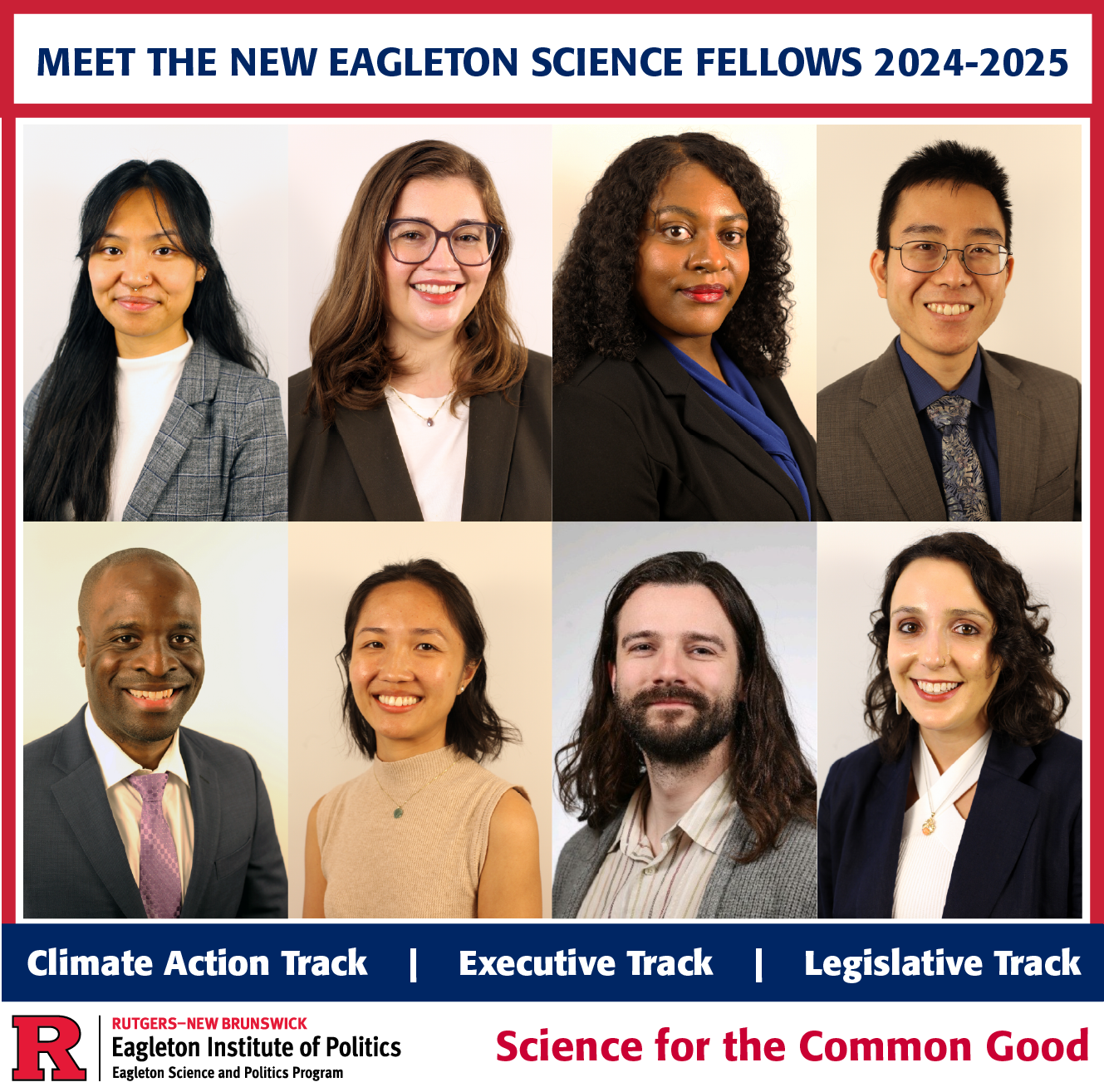Eagleton Institute Supports Eight Scientists in Bridging the Gap Between Science and Politics 
NEW BRUNSWICK, N.J. – Eight science fellows are currently working alongside New Jersey political officials to make science-informed public policy decisions thanks to the Eagleton Science and Politics Fellowship.
Over the next year, the Eagleton Science Fellows will serve as full-time science advisors in New Jersey state government, aiding in the development and implementation of state policy for issues ranging from clean energy to protecting children and families.
“The Science Fellows help drive forward the initiative to bring scientists, policymakers, and decision-makers together so that state-level policies are more informed and utilize available evidence,” said Anna Dulencin, Ph.D., Director of the Eagleton Science and Politics Program.
The Eagleton Science Fellows are accomplished doctoral-level scientists, engineers and healthcare professionals with a passion for public service and contributing to positive change in their communities. The Fellowship, which is part of the Institute’s Science and Politics Program, empowers highly trained experts to apply their knowledge and contribute to a more nuanced design and implementation of New Jersey policies.
Science Fellows are placed into the legislature as well as the executive branch full-time for one year. Meet the 2024-2025 Eagleton Science Fellows:
- Ellenore Craine, Ph.D., earned her doctorate in biochemistry from the University of Alabama at Birmingham. Dr. Craine is working with the NJ Department of Environmental Protection in an initiative to replace lead service lines.
- Florence Dou, Ph.D., is working with the NJ Board of Public Utilities on Solar for All and a commercial solar project. She received her doctorate in inorganic chemistry from the University of Washington.
- Aileen Eagleton, Ph.D., has a doctorate in materials chemistry from Dartmouth College and is working with the NJ Board of Public Utilities on their Urban Heat Island (UHI) pilot proposal.
- Walker Gosrich, Ph.D., holds a doctorate in mechanical engineering (robotics/AI) from the University of Pennsylvania. He is working with the NJ Office of Innovation on potential state regulatory actions related to AI and on data center incentives and impacts.
- Sadie Novak, Ph.D., earned her doctorate in chemistry from Syracuse University. She is working with the NJ Senate Majority Office in the Senate Environment and Energy Committee.
- Uchenna Orji, MD., is working with the NJ Department of Education on new training modules for educators to help them identify and report child abuse and neglect. Dr. Orji earned his medical degree from the Rutgers Robert Wood Johnson Medical School.
- Julia Palmucci, Ph.D., received her doctorate in molecular genetics and microbiology from Duke University. She is working with the NJ Assembly Minority Office on legislative analyses and as a committee aide.
- Justin Wang, Ph.D., is working with the NJ Department of Children and Families in the Office of Applied Research and Evaluation. Dr. Wang earned his doctorate in molecular and cell biology from The Scripps Research Institute.
“Eagleton is grateful for the support shown for the Eagleton Science and Politics Fellowship,” said Dr. Elizabeth C. Matto, Director of the Eagleton Institute of Politics. “Thank you to the Gordon and Betty Moore Foundation, Rutgers University, the Board of Public Utilities, and the NJ Legislature. The fellowship is made possible and continues with their support.”
Learn more about the Eagleton Science and Politics Fellowship Class of 2025.
ABOUT THE EAGLETON SCIENCE AND POLITICS PROGRAM
The Eagleton Science and Politics Program explores how science, technology, and American politics intersect; the political systems that connect them; and how deeper understanding and clearer communication within and across these disciplines can benefit policymakers, scientists, and the larger public.
ABOUT THE EAGLETON INSTITUTE OF POLITICS
The Eagleton Institute of Politics at Rutgers University—New Brunswick studies how American politics and government work and change, analyzes how the democracy might improve, and promotes political participation and civic engagement. The Institute explores state and national politics through research, education, and public service, linking the study of politics with its day-to-day practice.
###

